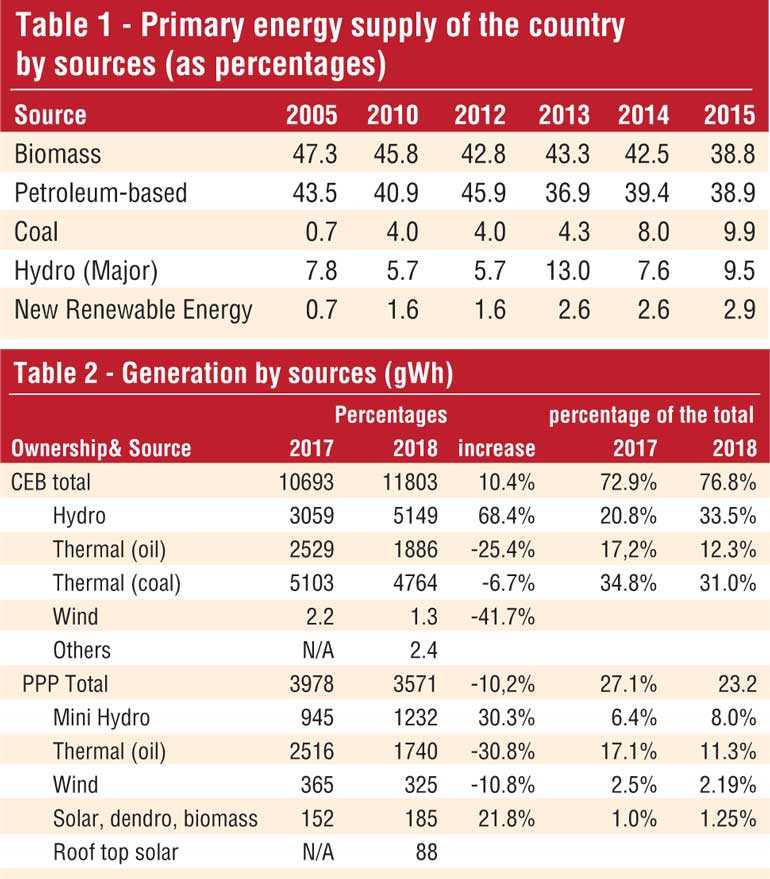Tuesday Feb 17, 2026
Tuesday Feb 17, 2026
Tuesday, 26 November 2019 00:00 - - {{hitsCtrl.values.hits}}

A problem confronting the new mini hydro power developers hanging over a period of time since 2013 has come to rest as an impasse acrimoniously ignored by the authorities concerned. This is happening at a time when the attention of the entire country is focused on the energy sector and in particular about the new renewable energy sources that should be harnessed to supplement the much needed electrical energy. 
It is pathetic to note that a matter of national importance such as the development of mini hydro power is allowed to remain draggy and neglected.
The supply of energy from different sectors have been changing over the past few decades and biomass, hydro and the imported fuel which were the primary energy sources of the country have now changed to a costly mix of the same with coal added on to the mixture. There has been a marked drop of the local components in the energy supply equation. It is strongly believed that there will be a significant growth in the share of coal and petroleum based energy sources in the future. This will no doubt add on heavily to a further depletion of the foreign exchange earnings of our country.
This position is made very clear by some statistical findings as shown in table 1.
It is alarming to note that the current cost incurred as expenditure for diesel or fuel energy in place of other sources to produce electricity has been estimated to be about $ 40 million per month (Rs. 6,000 million approximately). It calls for a serious commitment to address this issue in the national interest.
More recent statistics published by the Sustainable Energy Authority ascertains this further as seen in table 2.
Promotion and encouragement of new renewable energy sources become extremely important in such a context. The over dependency on the imported fuel based energy sources is bad for the country in many ways. While the drainage of foreign exchange appears to be the most significantly visible disadvantage there are worse long-term disadvantages associated with it.
Failure to harness the natural resource base of the country as alternative sources of energy should be considered as a much more important aspect. It is a waste of the resource base on the one hand and on the other hand it is a failure to provide opportunities for innovation to engage in more indigenous production activities. This will be a deprivation of opportunities to the country’s small and large entrepreneurs.
There are 16 MHP developers in this category awaiting CEB clearance to enter into PPAs. If each project invests Rs. 300 million, the total investment that the country gains is 4,800 million. It will be a big boost for many areas of the economy including the lending institutions and a whole lot of others who will get involved in these projects. The 16 projects held up in this manner have been granted approval to generate about 20 MW of power that will be connected to the national grid.
Mini hydro is a safe, clean and environmental friendly energy source. Unfortunately the CEB and the other authorities seem to harbour different attitudes towards this industry. A developer of a mini hydro project has to go through a variety of hassles in obtaining the required approvals.
They have to go through a thorny path with much red tape and other restrictions imposed by the authorities who are aware of the concerns and the interest of the developers. After going through all these adversities it is a pity they have got struck at the final stage due to the CEB taking an unusually adamant stand which appears to be more of an intransigence than a true legal barrier.
The position taken by the CEB is that certain provisions in the Electricity Act No. 20 of 2009 and in the Amendment Act No. 31 of 2013 do not permit them to enter into PPAs with these developers as they are required to tender these sites by publishing a notice in the Gazette. But the actual position is different and the CEB is not ready to accept that.
The section in the Act which required sites to be gazette was amended by the amendment Act in 2013 granting the authority to the Public Utilities Commission to waive off this requirement under certain conditions. It is stated as follows in the amendment act;
“The Commission shall, having considered the request made along with any supporting documents annexed thereto and on being satisfied that the necessary Cabinet approval had been obtained or a permit had been issued by the Sustainable Energy Authority, as the case may be prior to the coming into force of this act, grant approval to the Licensee to proceed with the procuring of the new generation plant…” The 16 projects caught up in this imbroglio have completed obtaining all necessary approvals including the Energy permit issued by the Sustainable Energy Authority and the Electric License issued by the Public Utilities Commission as follows;
Three MHPs have obtained their Energy Permits from 2014, 2015 and 2016 respectively; nine MHPs have obtained Energy permits from 2017; three MHPs got their Energy Permits in 2018 and one MHP in 2019. Energy permit is issued by the Sustainable Energy Authority after all the required approvals and fulfilment of all other eligibility criteria such as proof of availability of Funds. If they were given the approval for signing the PPAs the country would have benefited by the addition of over 20 MWs of power to the national grid. This negative attitude has even discouraged future investors and developers.
It is strange why CEB has taken a whipping hand when the Electrical Act has given full powers of Administration of the Act to the PUCSL stated as: “The administration of the provisions of this act shall vest in the Public Utilities Commission and shall exercise, perform and discharge all the powers, functions and duties as are conferred on or assigned to it under this Act.” It is clear from this section that the final approval and authority for granting the right to the developers in the procurement of the projects lies with the PUCSL. There are MHPs on whose behalf letters have been issued by the PUCSL asking the CEB to sign PPAs to enable them to commence work of their projects. But alas! CEB has, it looks like, taken the law into their hands! It appears as if they have an overriding authority above the PUCSL to decide on matters.
Unfortunately innocent MHP developers have become victims of power struggles and the country suffers as if nobody is there to care for. This is the state of affairs that prevailed over the last several years. Each one of these developers have already spent considerable amounts in the activities leading to the current stage involving approvals from authorities and land clearance issues, etc.
The MHP developers anxiously await the intervention of the new Minister of Power and Energy to resolve this matter.